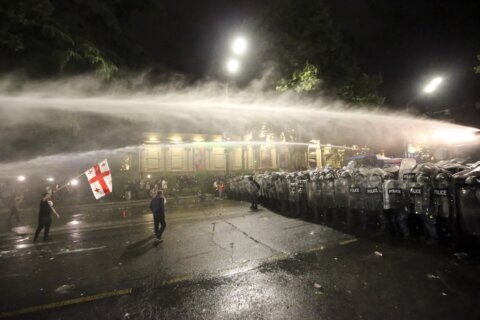HELSINKI (AP) — The European Union’s border agency is pledging to “significantly” step up its support to Lithuania in the coming days “due to the growing migratory pressure at Lithuania’s border with Belarus” that the Baltic nation is trying to contain.
The decision by Frontex, the agency responsible for coordinating border control between EU member states and third countries, was announced late Saturday following a video call between Frontex’s Executive Director Fabrice Leggeri and Lithuanian President Gitanas Nauseda.
“Lithuania’s border is our common external border and Frontex stands ready to help where needed,” Leggeri said in a statement. “We are ready to strengthen our level of support and deploy more European standing corps officers and equipment” to Lithuania, an EU and NATO member of 2.8 million.
Frontex’s operation, which started earlier this month with the deployment of a dozen officers and patrol cars, will more than double next week, the agency said.
Nauseda’s office said reinforcements pledged by Frontex were expected to reach Lithuania by July 15 and that some armed border patrols and additional translators arrived over the weekend. In addition, a patrol helicopter will be sent to Lithuania from neighboring Poland and discussions were under way to dispatch another helicopter from Germany, Nauseda’s office said.
In a tweet, Nauseda thanked Frontex for its support “to manage flows of illegal migrants through eastern border” with Belarus, another former Soviet republic that is not in the EU.
Lithuania, which has granted refuge to Belarus opposition figures, accuses its neighbor of organizing the border crossings by people mainly from Iraq, the Mideast and Africa.
In June, the number of illegal border crossings from Belarus into Lithuania rose six-fold, increasing the pressure on national border control authorities, Frontex said. The phenomenon has accelerated in July. More than 1,500 people have crossed into Lithuania from Belarus in the past two months — 20 times more than in all of 2020.
Tensions between the EU and Belarus escalated even more after Belarus diverted a passenger jet on May 23 to arrest an opposition journalist. Belarus’ authoritarian President Alexander Lukashenko has said his country will halt cooperation with the 27-nation bloc on stemming migration in retaliation for bruising economic sanctions the EU slapped on Belarus over the passenger jet diversion.
On Friday, Lithuania started building a double barbed wire fence on the Belarus border. It will run for 550 kilometers (342 miles), covering most of the nearly 680-kilometer (423-mile) border and cost 41 million euros ($48 million), according to Lithuanian authorities.
In addition, Lithuania has set up tent camps to accommodate the growing number of migrants.
Nauseda, on a visit to Poland on Sunday, said that “technical steps are necessary to make the border work and be a real barrier, because now it can be easily crossed.”
Nauseda said Lithuania was talking to the governments of the countries where the migrants come from and also with transit countries like Turkey in order to “curb the (illegal migration) process that is being supported by the Belarusian regime.”
“It is a kind of revenge for EU sanctions,” Nauseda said in Krakow, following talks with Poland’s President Andrzej Duda.
Duda said Poland will “extend the necessary assistance” to Lithuania and was talking about the best way to do that with Frontex.
___
Follow all AP stories on global migration at https://apnews.com/hub/migration
Copyright © 2024 The Associated Press. All rights reserved. This material may not be published, broadcast, written or redistributed.







